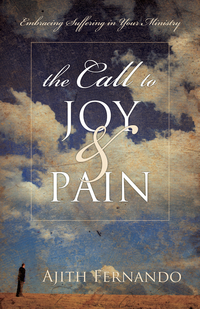Ajith Fernando: The Call to Joy and Pain
 Ajith Fernando, The Call to Joy and Pain: Embracing Suffering in Your Ministry (Wheaton: Crossway, 2007), 192 pages, ISBN 9781581348880.
Ajith Fernando, The Call to Joy and Pain: Embracing Suffering in Your Ministry (Wheaton: Crossway, 2007), 192 pages, ISBN 9781581348880.
The Call to Joy and Pain by Ajith Fernando is a provocative analysis of the issue of pain and suffering. While he does not treat the cosmic problem of the reason for suffering in the world, he does consider at some length the concurrently difficult problem of suffering for the believer. He rejects the pervasive notion that Christians should not suffer; that indeed something is wrong when they do. In contrast, he strongly advocates that “something is seriously wrong not when Christians suffer but when they do not have the joy of the Lord” (p. 10). His main theme is just that—both suffering and joy are essential to the Christian life (p. 15).
Fernando interweaves exegesis of the New Testament texts with personal experiences and anecdotal situations, thus creating a strong position. This little book is laid out in four main sections, entitled: (1) “Suffering and Joy are Basic to Christianity”; (2) “Suffering Brings Us Nearer to Christ;” (3) “Our Suffering Helps the Church;” and (4) “Servants of the Church.” Each of these is further broken down into subsections, which provide ideal elements for devotional or meditational study. This is not to imply that Fernando’s work lacks scholarly analysis or contribution to this field. Indeed, his exegesis is noteworthy for scholars and pastors alike. This fine little book goes beyond platitudes or ‘bon mots’ and tackles with a solid hermeneutic the problem of joy in the face of pain and suffering. Ajith Fernando’s viewpoint is largely based on a theology, anthropology, and even soteriology, derived from the Pauline tradition, without yielding to the temptation to proof text. Fernando’s thesis is aptly condensed into a thought he expressed early in the book, “So, according to the Bible, joy and pain can coexist. Christians don’t talk about suffering unless they also talk about the joy of suffering. It is the joy that makes the cross worthwhile, for it gives us the strength to bear it” (p. 19; cf., Neh. 8:10).

Fernando calls God’s people to put into practice a well-rounded and comforting evangelism.
The author explores the three things he sees as being needed to experience joy in the midst of pain: lament, consideration of our trials to be joyful, and surrender. Of these, the one we find most poignant is the last. Fernando writes, “If we cling to anything in life, even a good thing, that thing will surely take away our joys” (p. 43). This harkens back to the message of many, if not almost all, spiritual masters, not the least of which is St. Ignatius in his Spiritual Exercises (cf., SE, 23)1. We all know these things on something of a cloudy level, but Fernando brings home the point cogently and convincingly. Incidentally, although Fernando’s scope is primarily the Pauline tradition, his thesis is also supported by the Petrine tradition (cf., 1 Peter).
“Something is seriously wrong not when Christians suffer but when they do not have the joy of the Lord.” — Ajith Fernando
Reviewed by Thomas Doyle and Rebecca Skaggs
1 “Therefore, we must make ourselves indifferent to all created things, as far as we are allowed free choice and are not under any prohibition.”
About the Authors
Thomas Doyle, M.Div., did his studies in theology at the Church Divinity School of the Pacific. He is a long-standing participant in the Charismatic Renewal of the Catholic and Episcopal Churches. He is presently Director of The Metanoia Ministry, an evangelically-based counseling ministry in the San Francisco Bay area.
Category: Living the Faith, Winter 2009


